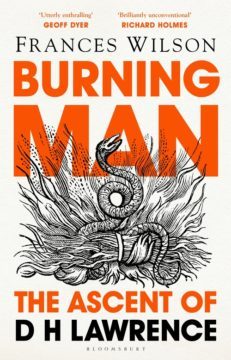David Wheatley at Literary Review:
 Beyond all this violent contrarianism, the Lawrence Wilson wishes to paint is a figure of ‘mysteries rather than certainties’. The ‘burning man’ of her title derives from a letter of 1913 in which Lawrence the would-be martyr for his art compares himself to his namesake saint, who famously embraced his martyrdom (death on a gridiron) to the point of proclaiming, ‘Turn me over brothers, I am done enough on this side.’ Wilson’s target is less a straightforward biography than a sifting of Lawrence’s legacy for what remains urgent and alive, the aim being to shed its infernal baggage in search of an abiding paradise. One threat to her Dante comparison is how remote from heaven Lawrence increasingly appears, his attachment to the physical world growing shriller the weaker his grip on it becomes. But these tensions are all part of the drama, not least where the question of sex is concerned. Sex in Lawrence must always be a full-on sacramental affair, but in everyday life he was uptight and prissy about being touched, unlike the more easy-going Frieda.
Beyond all this violent contrarianism, the Lawrence Wilson wishes to paint is a figure of ‘mysteries rather than certainties’. The ‘burning man’ of her title derives from a letter of 1913 in which Lawrence the would-be martyr for his art compares himself to his namesake saint, who famously embraced his martyrdom (death on a gridiron) to the point of proclaiming, ‘Turn me over brothers, I am done enough on this side.’ Wilson’s target is less a straightforward biography than a sifting of Lawrence’s legacy for what remains urgent and alive, the aim being to shed its infernal baggage in search of an abiding paradise. One threat to her Dante comparison is how remote from heaven Lawrence increasingly appears, his attachment to the physical world growing shriller the weaker his grip on it becomes. But these tensions are all part of the drama, not least where the question of sex is concerned. Sex in Lawrence must always be a full-on sacramental affair, but in everyday life he was uptight and prissy about being touched, unlike the more easy-going Frieda.
more here.
